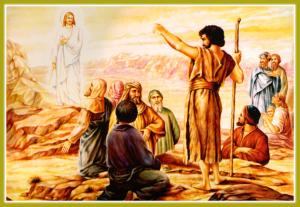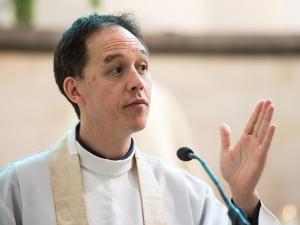I n the Catholic Church we don’t re-Baptize, but we regularly renew our baptismal promises. In the Catholic Church we always baptize individuals not groups or collectivities. But sometimes our attention is drawn to a whole world of ills, to vast territories of horror. In this post I am imagining help for the world coming somehow from the sacrament of Baptism and specifically from a renewal of our baptismal promises.
n the Catholic Church we don’t re-Baptize, but we regularly renew our baptismal promises. In the Catholic Church we always baptize individuals not groups or collectivities. But sometimes our attention is drawn to a whole world of ills, to vast territories of horror. In this post I am imagining help for the world coming somehow from the sacrament of Baptism and specifically from a renewal of our baptismal promises.
We renew our baptismal promises every time another person is baptized or confirmed and every year at the Easter Vigil. Baptism and Confirmation are gifts to the Church and the world, not just to individuals. I feel especially blessed whenever I get to witness one or the other. In the Easter Vigil we celebrate the rebirth of the whole cosmos through the resurrection of Jesus. Baptism is for a world in need of rebirth. We feel this need at some times more than others. Sometimes the world seems especially horrible. That makes me believe we can make other occasions to pray for the world with reference to the sacrament of Baptism.
The beginning of the practice of baptism in John’s ministry by the River Jordan did something like that. When I think of the crowds coming out to John in the wilderness, I have trouble imagining that they came to be relieved of the weight of their personal sins. Maybe there would be one or two from here and there who were terribly sorry for some evil thing they had done. But that would not make a movement such as John stirred up to challenge the powers of that world.
Peasant life was a daily struggle for survival. Making things worse, there were acts or situations, including sickness, debt, and touching a dead person, that made them impure in the eyes of the Law, as interpreted by the experts in the Law. By law the Temple was the place to go to be forgiven for these “sins.” A scribe could release a person from debt. A priest could declare clean one who had recovered from a skin disease, allowing that person back into society. For certain transgressions certain sacrifices were prescribed.
A lot of power and wealth accrued thereby to the temple establishment. If anything was weighing down the poor people of Palestine, it wasn’t personal sins but the sinful situation that defined their impurity, kept them marginalized, and impoverished them by taxes and fees, including those collected by the Temple. John knew well the ills of those horrible times.
Jesus preached, “The Kingdom of God is near. Repent and believe in the gospel.” It was addressed as much to the political situation of poverty and riches, inclusion and exclusion in Palestine as it was to the eternal destiny of souls. The repentance Jesus preached was a change of mind and outlook, a revisioning of what the world could be. The root meaning of “repent” is re-think, and it’s the same in the evangelists’ Greek. If repentance included sorrow for personal sin, it was equally a lament over the sin of the world.
The Church’s baptism has everything to do with what goes on in the world. And what goes on in the world is often horrible. Our world needs baptism as much as our souls. We can’t recover the words John the Baptist said over the victims of that age’s horrors. Perhaps something like the following renewal of baptismal promises would do for the times when our world seems all too horrible.
(Leader reads questions and prayer at the end. After each question all respond, “I do.”)
Do you reject Satan?
And all his works? .
And all his empty promises?
Do you refuse to be enchanted by the gods of this world: Money, Strength and violence, Nations and Races and Sexes, Luck and Fate?
Do you refuse the works of this world’s gods: envy, jealousy, hatred, prejudice, economic oppression, environmental destruction, war, and the violence of the powerful?
Do you turn away from the gods of this world when they make their empty promises of fame, honor, influence, excitement, and pleasure?
Do you believe in God, who is known as father and by many other names, . . . who calls into being powers and peoples with all their varied splendors, leading and disciplining them with the power and weakness of love, . . . who in ages past, with particular care, gave birth to the Jews, intending one people to be a blessing to all nations, . . . who then bore them and bore with them through persecution and their own sin, as witnessed in the Jewish Scriptures?
Do you believe in God’s anointed one, Jesus, Son of God from all eternity, first heir of the Father’s self-sacrificing love, eternally offering back that gift, to the Father’s ever-growing delight; . . . who nevertheless was formed in time of the flesh of this world in the womb of the virgin Mary, born a child of a laborer at carpentry, a Jew, a member of an oppressed tribe, even a Galilean, from where, as the saying went, “What good can come?”; . . . who, in obedience made his own the concerns of all he met, whether friend or enemy, rich or destitute, high-society or rebel; . . . who was rejected for proclaiming the Reign of God over all those human concerns, tried for blasphemy because he called sinners forgiven and those we reject blessed, abandoned by friends, and left alone by God, with not a single success to own at the end, only a cross; . . . who suffered under Pontius Pilate the Roman punishment for sedition, was crucified, died, and was buried and, fulfilling the Scriptures, came to the limit of parting from God and unity with a sinful world: the depths of hell; . . . and whom God approved, raising him bodily in the Spirit, glorified, the first of many brothers and sisters, to his place with the all-loving God, from which high place he will come again to preside over a renewed creation with all who will accept mercy and disown idols of pride or hopeless submission to the way things have been?
Do you believe in the Holy Spirit, Life and Fire blowing in the play and passion of Father and Son’s love; , , , who does love’s work in God’s Trinitarian life, in the created world, and between world and God, embracing all persons and things in unity yet saving and enhancing each one’s uniqueness; . . . who has inspired many scriptures; . . . who gave life to Jesus’ despairing followers; . . . and who brings people to the Father in their different ways, all in Jesus’ arms?
In that Spirit do you rely on the communion of saints on earth and in heaven, on apostles, martyrs, teachers, on all who encourage by word and deed, and on parents and forebears, the ones who gave us life?
In that Spirit do you accept the mission Jesus gave us, when he breathed his spirit upon us, to be part of his story, to honor and purify the human concerns we meet in the names of the Father and the Son and the Holy Spirit, looking forward, past our many failures, to God’s reign in all things?
Do you believe that God’s Spirit is always doing something new on earth, that there is, not Fate, but forgiving and being forgiven, bodily resurrection in a world renewed and transformed, and life with God and brothers and sisters ever-growing in love?
God, through the life, death, resurrection and ascension of Jesus, through the sending of the Spirit, and through the waters of Baptism, has given our world a new birth and conquered the powers of sin and death. May God also keep us faithful and hopeful through every trial and to the end of the age.
Amen.
















